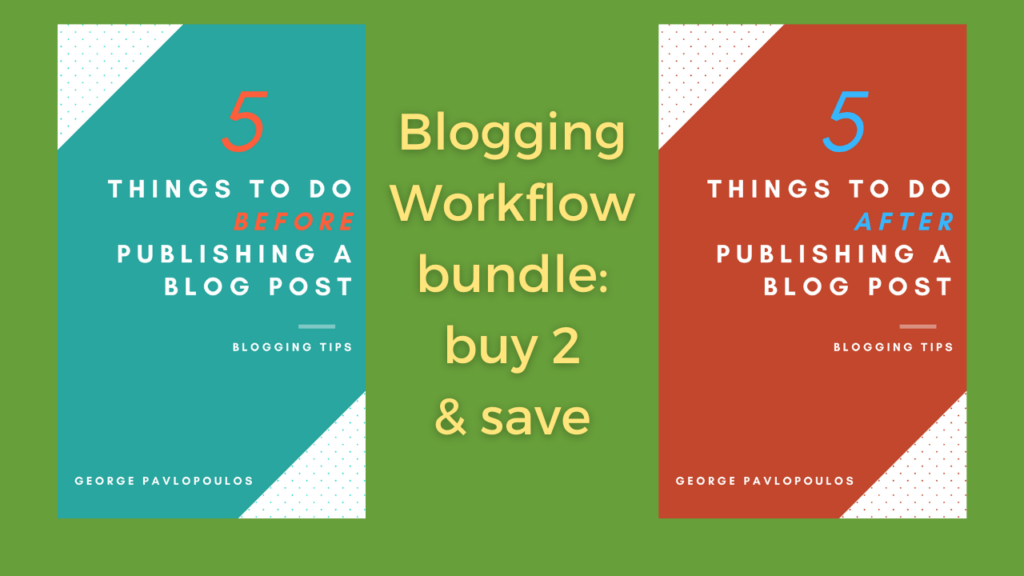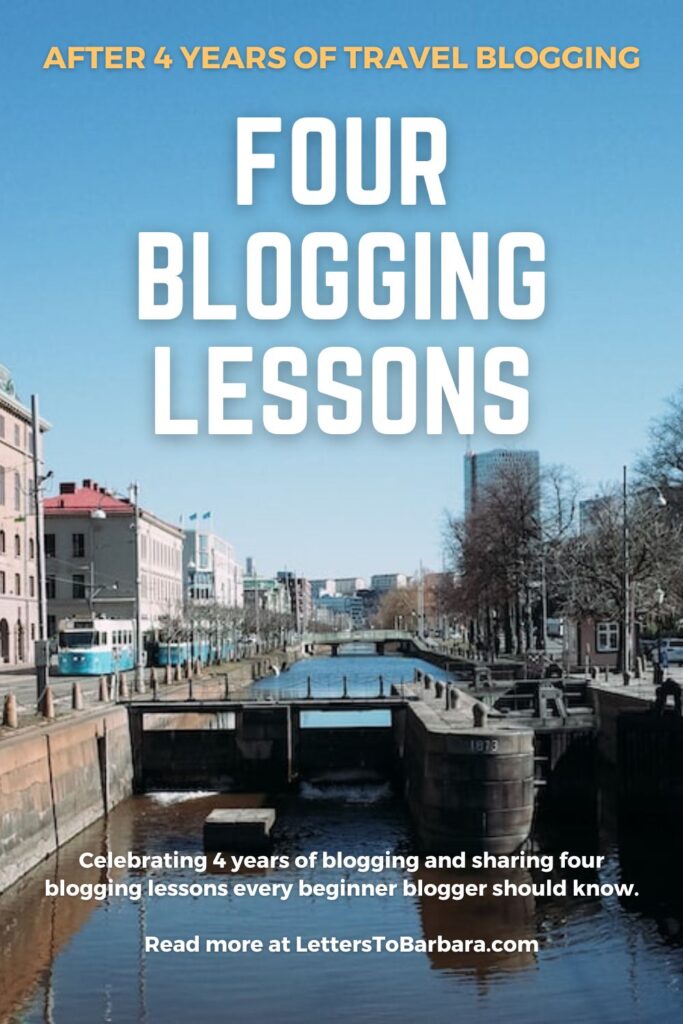I started this travel blog four years ago. Back in the day, I couldn’t even imagine the challenges of blogging. Let alone, of course, how hard it would be to run a travel blog during a pandemic. On the other hand, these annual reports about my experiences in the blogosphere became a habit and a way to share this journey with fellow bloggers. Celebrating a blog anniversary might sound too self-referential. However, that’s not what this blog post is all about.
It’s not a surprise that travel blogs became more relevant in 2022 after two years of restrictions. Blog traffic resumed, and a 50-60% growth always puts a smile on a blogger’s face. Since many people started thinking of creating a travel blog from scratch, today, I thought of sharing four blogging lessons I learned throughout these years. These are actually things that I wish I knew when I started blogging. They would have made my life so much easier, and I would be able to deliver better content from day one.
So, let’s move forward to the four travel blogging lessons I learned.
*Some links are affiliate links. It means that if you buy something, I might earn a small commission at no additional cost to you.
4-years blog anniversary: 4 travel blogging lessons

Blogging lesson 1: the importance of a content calendar
It might sound bizarre to start from this one, yet that’s probably the most valuable blogging lesson I learned. And here’s why.
Having a content calendar means so much more than the obvious thing. An editorial calendar is not a vanity item or a tool that makes you seem like a pro. Instead, its most important contribution is that it will keep you on a blogging track. Unless you’re blogging for fun, being consistent with your content is key to running a successful blog. Blogging is a marathon, not a sprint: you must look into the future when creating content and understand what your blog will look like six months from now.
It’s up to you how often you’d like to blog. I always publish a new post every Saturday, and on rare occasions, I might post something midweek. Some bloggers post multiple times per week, while others prefer to publish blog posts twice per month. One thing is sure, though: search engines love websites that create content. If you publish five articles this week and don’t post anything for six months, your search engine traffic will drop. Therefore, maintaining a blogging routine is vital for your blog’s success.
That’s where a content calendar comes in handy. You can plan weeks or even months, knowing exactly what you have to write and when to publish it.
What’s the best content calendar for bloggers?

The best content calendar is the one that works for you. In my case, it’s Google Docs.
Every January, I create a new document and write down the months. Then, I make three sections: month’s week, blog post title, and status. Since I post weekly, the first two are clear, I guess. Then, the “status” section indicates if I have already written or have to write the blog post. Finally, whenever I hit the “publish” button on my blog, I make sure to add an extra remark: “Posted.” And that’s pretty much it.
For the first eighteen months, I didn’t use an editorial calendar. The need to have one appeared during the pandemic when traveling became a sin, and running a travel blog became almost impossible. However, having a blog content calendar motivated me and kept me going in times when I couldn’t go anywhere.
Of course, there are plenty of content calendars out there, and some of them look beautiful. However, I prefer to save money for other blogging-related tools, and the humble Google Docs perfectly serves its purpose.
Blogging lesson 2: do keyword research before starting to write

Beginner bloggers tend to romanticize the idea of running a blog -and I did that too. People think they’ll just write about the things that interest them, and their blog traffic will soon skyrocket. Unfortunately, this won’t happen most of the time, and since every blogger wants to be read, most will just quit blogging.
If you want to see success from your blog and potentially monetize it, you should do keyword research before even typing the first word. Doing keyword research means understanding various parameters: how to rank for specific keywords on Google and other search engines, exploring the potential to be on page one of the search results, and estimating what to expect from the article.
For example, if you want to rank for competitive keywords from day one, I can assure you it’s lost time. That said, if a beginner travel blogger wants to write about Paris and believes they can rank for that word, it won’t happen. Instead, one should focus on long-tail keywords and see if there’s a chance to rank for them after doing keyword research. SEO (Search Engine Optimization) will be integral to your blogging life.
What’s the best keyword research tool for bloggers?

Everything is a matter of budget. I chose KeySearch.
KeySearch helps me optimize my blog posts for search engines, and during the last two years, I had great success with several articles. As a beginner blogger, I relied on free services and plugins. Most of them were fine, but I felt I didn’t receive enough information. KeySearch helped me analyze the competition, find keywords I could potentially rank for, and provide me with anything I needed before starting to write.
Of course, there are even more advanced keyword research tools (like, for example, Ahrefs), but these were out of my budget. And I always have a rule: always invest, but only in the things you can afford.
*If you’re interested in KeySearch, you can follow my link and add LTB20 on checkout to receive a 20% reduction on every annual plan.
Blogging lesson 3: rewrite old content

A common beginner-blogger misconception is to think you know everything. I thought the same too. I studied for months, and the day I started blogging, I thought I knew everything. I even felt so confident that I believed I wouldn’t have to correct any older posts. Let alone, of course, rewrite it.
Now, fast forward four years later. Sometimes, I even feel ashamed to read older blog posts. Whenever I feel courageous enough to open and edit an older post, I shiver. I cringe. There are mistakes, the content is thin, and there’s no way somebody will get any value from reading it. Some of my older posts are bad; very bad.
There’s only one thing to do then: rewrite them. Some might say that you have to repurpose old content, which is good too. However, if you find an older post that makes you cringe, rewrite it. Yes, you’ll have to delete everything and start writing from scratch.
You’ll also see a spike in traffic from maintaining high-quality texts in your blog. As time goes by, I treat older posts like totally new ones. I add them to my editorial calendar and do keyword research. Thin content harms your blog, and rewriting means you give an older post a second life. And actually, a better life.
How to identify when you have to rewrite a blog post?

You are the only one to judge your content. If you discover an older blog post that makes you feel uncomfortable, that’s the best signal.
Of course, not every blog post that needs rewriting has to make you cringe. If you use a keyword research tool like KeySearch, you can also see if you had a significant drop in rankings. For example, if you once saw traffic to a blog post, but this doesn’t happen anymore, it might be that other people wrote more relevant texts about the topic. Or that your article is not relevant anymore due to outdated information.
In my case, during the first two years, I rarely rewrote older blog posts. I sometimes checked them and did some corrections here and there. However, during the last sixteen months, I rewrote several older posts (and I still have plenty to work on). And guess what? Each post brought fresh traffic to the blog. Honestly, I wrote this blog anniversary post with a significant spike in traffic due to an older article I updated a month ago.
Blogging lesson 4: set personal milestones and not unrealistic goals
Instead of adding a photo in this sub-section, I added an Offspring song. Why? Because of that line in the lyrics: “cruelest dream, reality.”
One thing I wish I had avoided back on the first day is setting unrealistic goals. I’m not talking about ambitions (it’s good to have) or where you’d like to be in some years (it’s everyone’s right to daydream). What I mean here is to avoid tilting at windmills (like Don Quixote). For example, setting a goal of having 100,000 visitors per month after a year of blogging is unrealistic. Instead, adding a personal milestone, like publishing 50-60 high-quality blog posts within the next 12 months, is better.
When I started blogging, I wasn’t obsessed with metrics, but still, there were days I said I had to double the traffic, triple the traffic, and quadruple the traffic. Apparently, this couldn’t happen with my blogging schedule and routine. So a year or two later, I realized that it’d take time for my blog to bloom. And this was okay.
Why is it better this way? Because, somehow, it is liberating. I started travel blogging because it sounded nice and became even better after I got addicted to it. I didn’t want to lose the joy of writing and publishing just because the metrics didn’t grow as fast as I wished. It was this mindset that actually saved me when the pandemic hit the world. And most likely, it’s the reason why I didn’t quit, and I kept writing about journeys at times when everyone was stranded at home.
That said, avoiding unrealistic goals and setting personal milestones kept me going. The best part? After I quit setting unrealistic goals, the blog traffic started growing, and a good income started appearing.
Blog Anniversary: conclusion

It’s time to celebrate. A 4th blog anniversary is one more milestone. In last year’s blogging recap, I wrote that crossing the three years of blogging was the first real milestone. This year though, on the occasion of the blog anniversary, I decided to think of the things I wish I knew and the things that make me proud of this blog. And since I just shared my blogging lessons, I’d also like to tell you what makes me proud about the Letters to Barbara.
I’m proud that this travel blog attracts thousands of readers per month, and I’m delighted that people enjoy what they read. Moreover, I’m proud of my Polaroid zines and the people subscribing to my mailing lists. But more importantly, I’m proud that this blog is still here and that I still have the luxury to travel and earn money from the effort I put into writing.
So, here’s to four years of travel blogging. Thank you very much, dear reader, for being part of this journey.
More about blogging: How to create a travel blog, The best blogging tools, Reasons to start blogging
You can see all my blogging articles here.
Pin it for later

Sharing is caring. Share this article about my 4th blog anniversary and the blogging lessons with your friends.
Last Updated on September 24, 2022 by George Pavlopoulos

Congratulations on making it to the 4-year mark George. Slowly, slowly, you can make big things happen. One of your lessons about going back and improving old posts is very valid. I have only done one new blog post in the last two months while fixing up old posts, and surprisingly my traffic is up 25% to an all-time high. If you have some excellent content, that will keep the visitors coming no matter what. And what surprises me most is blog posts you think won’t do well that boom. I did a post on Thor Love and Thunder (Greek Gods Cast) after watching the movie, just for a bit of fun. It has almost reached 10,000 views (9,871 to be precise, as shown in WordPress) in about 10 weeks. From now on, every time there is a Thor movie, I will be there.
I am looking forward to reading your interview replies. I have now created an Interview heading on my sidebar. I’ll place your interview directly underneath: Interview with The Smooth Escape about Greece.
Hey John!
Indeed, repurposing or even rewriting older blog posts can significantly increase traffic. I’m so glad that your posts boomed -you have excellent material on your website. Visitors will keep returning as long as they find relevant content, and updating older posts with current info is definitely one of the keys to blogging success. I saw similar results with some of my older blog posts: after rewriting them, the traffic increased.
I have already started with the interview replies, and I’ll soon send them your way. I expect it to be sometime next week, and I had lots of fun replying to them. I’m sure it’s the longest interview I ever gave, and I’m glad it’s for “Greek Gods Paradise.” 🙂
All the best,
George